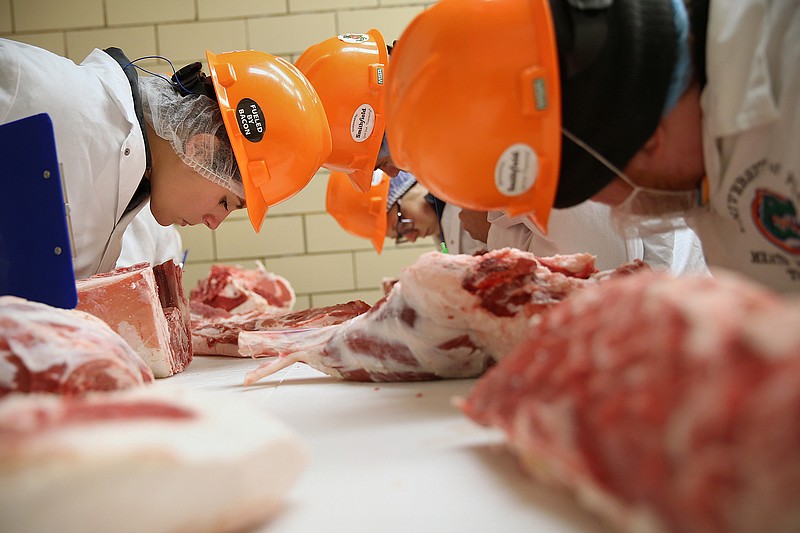STATE COLLEGE, Pa. - Students circled up in the lecture hall and locked hands, their red hardhats bowed toward their boots. In a nearby meat locker, their practice exams hung on hooks.
They thanked the Lord for safe travels from Lubbock, Texas, to Pat's and Geno's Steaks in South Philly, where they sampled cheesesteaks, and now to this small building in the shadow of Penn State's Beaver Stadium. After a collective "amen," the Texas Tech University Red Raiders went into the locker to scrutinize frozen pig carcasses and other cuts of pork and beef.
"Welcome, meat judgers!" was written on the dry-erase board.
There is a competitive world of collegiate meat judging, and in it, Texas Tech is a dynasty, with the national championship often changing hands between that team and archrival Oklahoma State. Yes, this is serious, though a recent Friday morning was merely practice, a warm-up for the Eastern National Intercollegiate Meat Judging Contest the following day at Cargill Meat Solutions in Bradford County. The American Meat Science Association said the first such program started in 1926 at the International Livestock Exposition in Chicago.
While there are trophies and bragging rights involved, meat judging, like agricultural fairs, has real-world applications for the beef industry, educators, and butchers. Cuts of beef, fat content, even bone-in vs. boneless are standards checked by the U.S. Department of Agriculture. Most competitions are beef, pork, and lamb. In some areas, though, hosts will present a special cut for judgment, such as goat in the Southwest; in Pennsylvania the next day, it would be veal.
"Those are national standards from East to West," said Jonathan A. Campbell, an associate professor at Penn State and the school's meat specialist. "Whether you're buying from California or the Midwest or the East Coast, meat companies would standardize where those cuts were from and what can and can't be in that package."
That Friday, the University of Florida team arrived at Penn State's Meats Laboratory first, and the Gators were already in the meat locker when Texas Tech's large team strode in wearing knee-length, insulated red coats. The teams were made up of both men and women, but while Florida and the Ohio State Buckeyes had about a half-dozen students each, Texas Tech had nearly two dozen, all of them in and out of the freezers for the early-morning "workouts."
"I mean, we call it a workout, but we're not in shape," said Kyle Mendes, the University of Florida's meat coach.
The Florida team also came to Penn State via Philadelphia, but skipped the better-known cheesesteak haunts for John's Roast Pork in South Philly. The Gators were traveling in a 15-passenger van.
"It renewed my faith in the cheesesteak, but apparently I should have gotten the pork," Mendes said.
Meat judging, as you might imagine, is more popular in rural states where agriculture is a major force, including Texas, Oklahoma, Florida, California, and Colorado. Texas is home to the most beef cattle in the United States, with 4.6 million. Pennsylvania ranks 33rd on that list, with 225,000; New Jersey is 44th, with 9,500. Penn State did not have the numbers to field a team this year, but plaques from past victories line a wall in the lecture hall.
"We have the meat, and it's something most teams would do for each other," Campbell, a former coach at Iowa State, said.
Campbell set up the freezer for the students but was also around to prepare for Penn State's weekly meat sale. Outside, a line of customers was already winding down the sidewalk. The Nittany Lions were playing at Maryland that week, but if there were a home game, Campbell said, the line would be stretching for a quarter-mile.
"People camp here and will just take the steaks back to their RV and start grilling," he said.
Joining a meat judging team provides ample networking for students who want to get into the beef industry, like Jacob Lehman, a fourth-year animal science major at Florida.
"I just haven't decided if I want to be in the live side of beef production or the dead side," Lehman said in the meat lab's lecture hall.
Mendes said Texas Tech's coach, Mark Miller, is comparable to the nation's best football coaches. Miller is the "San Antonio Stock Show and Rodeo Distinguished Chair in Meat Sciences" at Texas Tech, too, but remains humble about the team's 12 national championships. The previous day, his team stopped at a veal plant for some fine-tuning.
Conner McKinzie, who led the Texas Tech Raiders in the Friday morning prayer at Penn State, said that most of his teammates are there for the camaraderie. But they definitely want to beat the Cowboys come November.
Last year, Texas Tech lost to Oklahoma State by a mere 48 points.
"It is a competition," said McKinzie, of Stephenville, Texas. "We have a great legacy and we always have the goal of winning and being national champions."

